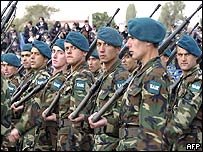
Partition? No way
Shiites Press for a Partition of Iraq
Creating federal regions would curb the violence, backers say. Others see it as a grab at oil wealth.
By Borzou Daragahi, Times Staff Writer
August 9, 2006
No, the Hakims want a fiefdom, and the Kurds want a country.
BAGHDAD — They have a new constitution, a new government and a new military. But faced with incessant sectarian bloodshed, Iraqis for the first time have begun openly discussing whether the only way to stop the violence is to remake the country they have just built.
Leaders of Iraq's powerful Shiite Muslim political bloc have begun aggressively promoting a radical plan to partition the country as a way of separating the warring sects. Some Iraqis are even talking about dividing the capital, with the Tigris River as a kind of Berlin Wall.
ADVERTISEMENT
Shiites have long advocated some sort of autonomy in the south, similar to the Kurds' 15-year-old enclave in the north, with its own defense forces and control over oil exploration. And the new constitution does allow provinces to team up into federal regions. But the latest effort, promulgated by Cabinet ministers, clerics and columnists, marks the first time they have advocated regional partition as a way of stemming violence.
"Federalism will cut off all parts of the country that are incubating terrorism from those that are upgrading and improving," said Khudair Khuzai, the Shiite education minister. "We will do it just like Kurdistan. We will put soldiers along the frontiers."
The growing clamor for partition illustrates how dire the country's security, economic and political problems have come to seem to many Iraqis: Until recently, the idea of redrawing the 8 1/2 -decade-old map of Iraq was considered seditious.
Some of the advocates of partitioning the country are circumspect, arguing that federalism is only one of the tools under consideration for reducing violence.
But others push a plan by Abdelaziz Hakim, head of the Supreme Council for Islamic Revolution in Iraq, a political party. Hakim advocates the creation of a nine-province district in the largely peaceful south, home to 60% of the country's proven oil reserves.
.......................
Critics scoff at the idea that any geographical partitioning of Sunnis and Shiites will make the country safer. Some observers warn that cutting up the country's Arab provinces into separate religious cantons would be as cataclysmic as the partition of Pakistan and India in 1947.
Although growing numbers of Iraqis acknowledge that their country is in an undeclared civil war, a partition would "actually lead to increasing violence and sectarian displacement," said Hussein Athab, a political scientist and former lawmaker in Basra.
Critics of partitioning note that rival Shiite militias with ties to political parties in government appear to be responsible for as much of Iraq's violence as Sunni insurgents are, and have been known to turn their guns on one another.
............................
A U.S. Embassy spokesperson declined to comment publicly on such a volatile issue. But U.S. policymakers also have begun to warm to the idea. Sen. Joseph R. Biden Jr. of Delaware, one of the Democratic Party's leading voices on foreign policy, began openly advocating such a move this year.
"I think it's the only way out," says Ivan Eland, a former House Foreign Affairs Committee staffer who is now an analyst at the Independent Institute, an Oakland think tank. "Iraq is already partitioned. Kurds don't want to be part of it. And any central government controlled by one group, the other groups are going to be afraid of being oppressed by it."
The prospect of a decentralized Iraq drove opposition groups for decades; Shiites and Kurds were brutally suppressed under Saddam Hussein's Sunni-dominated regime, and once they came to power they wanted to weaken the central government. In a referendum last year, a constitution including the option of devolution was approved despite nearly uniform Sunni opposition.
The Turks will invade an indepdendent Kurdistan.
Sadr will not tolerate a seperate Iraq.
Anyone pushing this is unaware of the history.
No comments:
Post a Comment